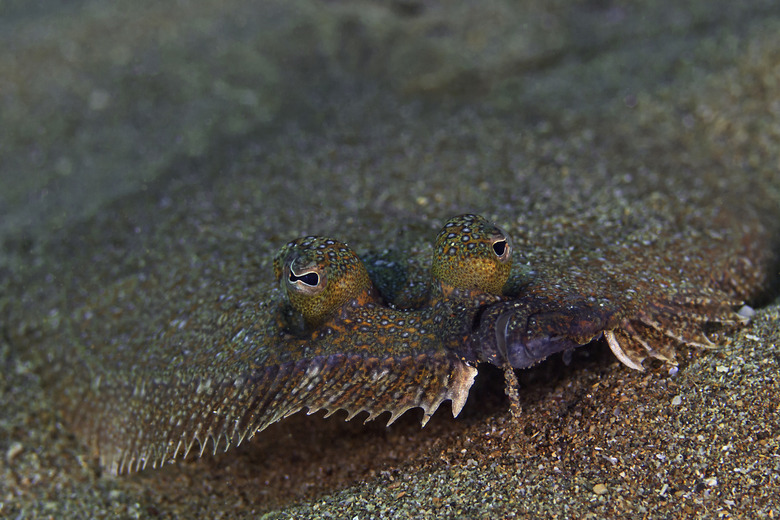The Difference Between Sole & Flounder
At first glance, sole and flounder may appear to be the same kind of fish. They both have flat bodies and similar, though distinct, morphologies – they even taste alike, semisweet and with a light and flaky texture. However, these two groups of fish differ in several fundamental ways: their taxonomic groupings, their bodies, and their distribution across the world. Members of both informal taxonomic groups find use as food among humans. Because of their similarities, many people may consider them the same kind of fish. Their method of survival, lying flat at the bottom of the ocean to protect against depredation, seems a unique enough evolutionary strategy for people to lump these fish into the same grouping.
TL;DR (Too Long; Didn't Read)
Flounders and sole may appear similar, but flounder is in a broader taxonomic grouping, and the fish have some differences regarding their bodies and distributions across the globe.
What's in a Name?
What's in a Name?
The taxonomic order Flatfish comes from the fact that its constituent members have flat bodies. This grouping includes sole, flounder, plaice and halibut. The term "sole" refers specifically to fish in the family Soleidae in the order Pleuronectiformes. It represents 30 genera and 130 families of fish. The term "flounder" refers to fish in the families Achiropsettidae, Pleuronectidae, Paralichthyidae and Bothidae.
Shape and Side
Shape and Side
While both sole and flounders have flat bodies, each one has some subtle differences that set it apart. Both fish have evolved flat bodies with both eyes facing upward to protect themselves against predators and to aid them in hunting. However, most sole tend to be "right-eyed," meaning the right side of their bodies faces upward. Flounders have more variation between being right-eyed and left-eyed. Interestingly, flatfish start life with one eye on each side of their bodies, and they spend this early developmental stage swimming. As they grow, one eye migrates to the fish's dominant side, and they start living on sandy ocean floors. Flatfish species tend to have roughly oval-shaped bodies, though this can vary dramatically from species to species: some have arrowhead-shaped bodies, for instance.
Spread Across the Globe
Spread Across the Globe
Most often, sole can be found in the eastern Atlantic Ocean and the Mediterranean Sea. Flounders, on the other hand, usually make their homes in the cooler waters of the North Atlantic and Pacific oceans. However, instances of these groups can be found in most places on Earth, and both have species that spend their lives in estuaries, places where rivers meet the ocean.
Cite This Article
MLA
Johnson, Doug. "The Difference Between Sole & Flounder" sciencing.com, https://www.sciencing.com/difference-between-sole-flounder-5841071/. 30 April 2018.
APA
Johnson, Doug. (2018, April 30). The Difference Between Sole & Flounder. sciencing.com. Retrieved from https://www.sciencing.com/difference-between-sole-flounder-5841071/
Chicago
Johnson, Doug. The Difference Between Sole & Flounder last modified March 24, 2022. https://www.sciencing.com/difference-between-sole-flounder-5841071/
